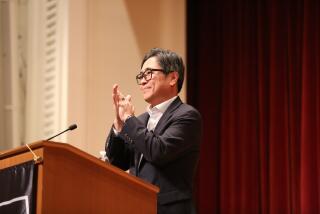Poetic License
- Share via
Little noted in the rush of events but possibly long to be reflected on is the imminent appointment of the first official poet laureate of the United States, as ordered in an Act of Congress.
The event--blessed or not remains to be seen--culminates more than two decades of legislative lobbying by Sen. Spark M. Matsunaga (D-Hawaii), himself a versifier. The selection will be made by Daniel J. Boorstin, the Librarian of Congress, and the honoree will also serve as the library’s consultant in poetry--a position that has existed for 50 years. Together the jobs will pay about $45,000 a year--not too bad for a profession traditionally associated in story and song with imminent starvation, freezing garrets and fat ladies next door who are reputed to be dying of consumption.
The poet laureate must be a living person. That requirement automatically eliminates a considerable amount of native talent. The laureate will be expected to produce at least one major work during his tenure, and to appear at various national ceremonies.
Poets laureate are, of course, old stuff for England. The office may have had its origin way back in the 13th Century, under Henry III. Henry was pious, devout and much given to bumbling into unsuccessful wars against the French. He is said to have kept a fellow around the palace at a salary of 100 shillings a year to be Versificator Regis, or king’s poet. “Send in my Versificator Regis,” Henry used to say. “I could use a few chuckles after that last fiasco in France.”
A century later Geoffrey Chaucer was given the title of laureate by admiring contemporaries, but the first official poet laureate--that is, a salaried member of the royal household--was John Dryden, in the 17th Century. He had some notable successors--among them Wordsworth, Tennyson and, in our own time, Sir John Betjeman. Contrary to popular belief, the poet laureate is not required to crank out verse on notable occasions--though many unfortunately have felt the urge to do so. This has led to no end of dreadful rhymes marking births, weddings, coronations and other calamities that regularly befall the royal family.
We don’t envy the American poet laureate, whoever it may be. Unlike the emperor of Japan, whose contributions to the national haiku contest always wow his countrymen, our own designated top poet can’t look forward to automatic respect. For no matter how good the poet’s output, it’s a sure bet that a million amateur rhymesters will always be standing ready to pounce in scornful judgment. So we will pledge now
Ne’er to speak ill of our first laureate,
Nor carp at the poems he or she may beget.
Whether free verse, epic, elegy or sonnet,
It’s a plenty tough job, and we don’t wannit.
More to Read
Sign up for our Book Club newsletter
Get the latest news, events and more from the Los Angeles Times Book Club, and help us get L.A. reading and talking.
You may occasionally receive promotional content from the Los Angeles Times.







